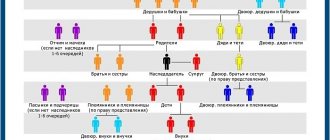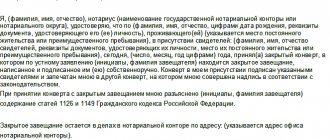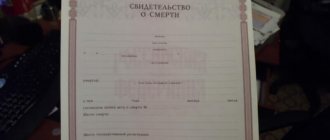The Unified Register of Inheritance Cases is a database that stores information regarding inheritance and the will of citizens who have ever left or accepted an inheritance. It greatly simplifies the life of potential heirs. For example, you can find out whether a probate case has been opened or whether a will has been drawn up.
Now, to obtain information, it is enough to send a request on the website of an Internet service that opens access to the registry. To do this, you need to fill out the request form and submit your application.
The essence of the work of the unified notary information system
To formalize the owner's right, it is necessary to have an idea of the state of the process. Searching for inheritance cases is not the only goal pursued when creating a unified database for searching for inheritance. This is no less popular function, as is the search for heirs who have the right to claim a share of the inheritance. Once you have access, it's easy to do.
The search for heirs is simplified if there is a will where personal data is indicated. But if you have to divide the inheritance according to the law, it is sometimes difficult to find out which notary has opened the inheritance case. Knowledgeable people turn to the registry, which states not only this. As a result, searching for a probate file is simplified to simply filing a request and waiting for a response. The register is an archive that stores information about inheritances registered through notary offices registered in the Russian Federation.
Distribution of notaries for inheritance cases
The duties of a notary include a wide range of legal transactions. Legal experts are not authorized by law to carry out certain regulatory actions. This means that, if necessary, the notary has the opportunity to engage in different types of activities. When choosing which notary to contact regarding acceptance of an inheritance, the successor must take into account important conditions, including the following:
- The registration of the testator's place of residence must be consistent with the lawyer's place of residence.
- The distribution of notaries for inheritance cases occurs according to alphabetical order. Each specialist is allocated a certain period of letters, and the choice of which notary you can register an inheritance with is based on the surname of the deceased relative.
- In the absence of information about the registration of the testator, the property is registered in a company located in the subject where the property or a significant part of it is located.
The successor may be faced with the problem of how to choose a notary to formalize the inheritance if a written will has been drawn up. The specificity of the document is that it is drawn up in two copies, one of which is provided to the heir, and the second remains in the folders of the legal specialist.
According to the standards of the Civil Code of the Russian Federation, an inheritance can be signed off from any notary. In the future, when searching for a document, if its location is unknown, you can contact any notary, who, in turn, will find the address of the required office using the general database.
When deciding which notary to register the inheritance with, the successor should be guided by its territorial distribution.
Unified register of wills and inheritance cases in the Unified Information System
The database stores notes on operations carried out within the framework of inheritance cases. If the heirs were searched by a notary, registration data will be sent in response to the request. Any action from drawing up a will, opening paperwork, entering into an inheritance, distribution of inheritance is displayed in the register, which is very useful and convenient.
Why is a registry needed?
The register is needed in order to:
- Simplify the procedure for collecting documentation and searching for heirs. The register stores contact information, addresses, and registration information.
- Reduce the number of crimes. Previously, it was impossible to verify the certificate of inheritance rights.
Since the creation of the unified register, the number of frauds associated with entry has decreased by almost five times
Who does this concern?
In fact, the register is necessary for several categories of subjects at once. Useful information:
- For heirs: the question of how to find out whether an inheritance case has been opened is being resolved.
- For notaries: it makes it easier to search for inheritance and for other notarial procedures.
- Law enforcement agencies: establishing the reliability of certificates of inheritance rights in criminal cases of fraud.
- Courts and bailiffs: to verify the certificate of inheritance by law and collect debts in accordance with a court decision.
For each category, only a few examples of reasons for applying to the registry for information about inheritance are given.
Prices for notary services
Notaries charge a certain fee for their services within the limits of the law. Contacting specialists entails material costs, which are regulated by state regulations.
The payment amount includes not only the preparation and certification of documents, but also the technical and legal aspects accompanying the paperwork.
The cost of a notary's work when registering an inheritance consists of the following points:
- registration of a will – from 1900 rubles;
- cancellation of the previous version of the will – 500 rubles;
- certification of will – from 100 rubles;
- certification of the successor’s assumption of authority certificate – from 100 rubles;
- issuance of a certificate of inheritance – from 100 rubles.
In addition, when entering into inheritance, the applicant pays a state duty in the amount of 0.3 or 0.6% of the assessed value of the property. The higher the value of the inherited property, the greater the amount that will have to be transferred.
You can first consult with a specialist as part of free legal assistance on any of the Internet sites or look for an office that provides free advice in your city.
How to find out information about inheritance?
There is an Internet service that allows you to obtain sufficient data about the inheritance by accessing the registry. All you need to do is go to the website, fill out the fields to form a request and submit your application. The registry system will automatically find everything that has ever been mentioned by a notary. This is not only about searching for heirs under a will. The register contains notes about cases when the inheritance was actually entered into (without notarial participation).
Access to information in the Unified Information System
The service is free. There are also no restrictions on categories of subjects. This is the simplest answer to the question of how people learn about the opening of inheritance cases. An individual can quickly find an inheritance in the registry if the testator has died. Notaries, investigators, banks, judges and bailiffs also search for heirs using the registry.
Who can receive information about the opening of a case?
Despite the confidentiality, the information is available to any category of citizens. It is enough to enter the last name, first name and patronymic of the deceased in the appropriate fields. An extract from the register contains information about the certificate, but does not concern the value of the inheritance. Authorized persons, government officials, notaries, and courts have the right to learn in detail about an open will. But ordinary citizens are also classified in this aspect.
Outsiders
A publicly accessible register helps determine which notary is handling the inheritance case. The register also indicates the number of the inheritance certificate. The notary's office will tell you what is included in the inheritance, if the applicant has sufficient rights to use confidential information from the register. Heirs claiming inheritance under a will, with a mark in the register upon presentation of a passport, will easily achieve what they want.
Relatives
The unified notary information system is open to everyone. But as for such data as the value of the inheritance, location, list of applicants, it is closed from outsiders. But if you go to the notary office and present evidence of family ties, the authorized person submits a request to the registry, and an extract comes from the registry indicating everything that is needed to enter into an inheritance.
Information at the request of state and municipal authorities
When registering an inheritance based on the fact of ownership of property, the procedure is carried out with the involvement of the leadership of local self-government bodies. Officials also need to conduct a check, for which they need to know how to find a probate file. The Federal Chamber of Notaries issues documents based on official requests. For this purpose, a corresponding statement is written. The paper is delivered to the reception area. A receipt is marked and an entry is made in the incoming correspondence log.
Information on individual requests
It is superficial, but gives an understanding of the most important points, indicating what needs to be done next. In the Unified Register of Wills, inheritance cases are registered, numbered and dated, which is displayed in the search program after entering the initial data. Knowing that the inheritance is available, it is enough to contact the authorities authorized to issue the certificate. This must be done within six months. The starting point is also contained in the register - the date of opening of the inheritance.
Can I contact any notary?
In contrast to the system that distributes notaries according to districts and according to the alphabetical principle, a project called “Inheritance Without Borders” (NBG) began its activities in the Russian Federation.
The essence of the idea is that successors can use the services of the selected specialist, regardless of territorial and alphabetical distribution. However, this rule applies to cases in which the death of the testator occurred after the entry into force of the new rules. For applicants whose relatives died before the introduction of the NBG, it is expected to contact legal experts according to the old principle.
The program was first tested on August 1, 2005. Thus, inheritance cases opened after this date fall under its scope. Heirs have expanded rights and independently determine how to choose a notary to register an inheritance in any area of their locality.
The sphere of influence of the NBG extends to Moscow and its region (since 2014), St. Petersburg and regional entities (since 2014). In addition, residents of the Chelyabinsk (2014), Novosibirsk (2015) and Irkutsk (2016) regions, Altai (2014) and Perm (2015) territories have such powers. In these constituent entities of the Russian Federation, citizens have the opportunity to choose a notary in any district, regardless of its territorial distribution.
How to use the service?
The search works by the testator's last name. As a result, you can find the notary who opened the inheritance (also indicated in the register). Further actions are stipulated by the Civil Code. Having appeared in person at the place of opening of the inheritance indicated in the register, the applicant writes a statement. 6 months from the moment the testator is officially considered dead, a document is issued on the basis of which the property is re-registered to the heir.
How to find out if the deceased left an inheritance?
There is no database of heirs in Russia, and cannot exist. A written expression of will allows you to appoint any person, not necessarily a relative, as a legal successor. Therefore, the successor is interested in accessing the registry in the first place. Having found out the address of the notary at the location of the inheritance (opening of the inheritance case), applicants go through the procedure of obtaining a certificate of ownership. The register stores information about the existence of a will and inheritance.
Nuances you need to know when entering data
To obtain the registration number of the required document, the full name of the testator is sufficient. Next, other applicants are being sought for inheritance. Before checking the certificates of inheritance rights for accuracy, make sure that the full name matches the person you are looking for. This data is often repeated. The service issues certificate numbers of inheritance rights according to the law for namesakes. Dates of birth and other information must be compared to identify the testator.
How to check a will while the testator is alive?
Only he knows which will is genuine during the lifetime of the property owner. Heirs or other citizens cannot possess this information.
This is due to the fact that the Civil Code establishes the secrecy of a will. Therefore, the notary, witness, executor, executor and other citizens who are present during the execution of the will do not have the right to disseminate the information received.
Art. 1123 of the Civil Code of the Russian Federation establishes the right of the testator to receive compensation for moral damage in the event that someone disseminates his secret.
Moreover, a will can be changed countless times during the owner’s lifetime. Therefore, its authenticity does not matter much. It may be changed at any time.
Is it possible to find out about the presence of a will if a person is still alive?
No, it’s easier to wait until it appears in the register of open inheritance cases. Data about future inheritances are not disclosed because they are considered an absolute secret for everyone except the will-maker and the notary. There is no such information available in the online information retrieval system. There is a database for storing registration records of executed wills, but it is accessible only to a notary.
Those claiming compulsory share have nothing to worry about. The right is here to stay. For the rest, all you have to do is be patient and then access the registry again. Data are recorded immediately after death. In order to carry out the procedure for entering into an inheritance correctly and the result is undeniable, it is enough to hire a lawyer specializing in inheritance matters, draw up a power of attorney and instruct him to carry out the necessary actions.
If a will is not found
In this case, it is more likely that it simply does not exist. Otherwise, there would be a mention in the register. Mistakes also happen, such as, for example, when registering an inheritance without actually notary support. But if the existence of an expression of will during life is not established and a mark is not made in the register, this does not mean that the inheritance is unavailable.
In such situations, a notary will help, and the division of property will be carried out according to the law in order of priority. The presence of priority applicants does not mean that you need to abandon the idea. They will issue a refusal, agree to compensation, will be found unworthy, or may even die, no matter how cruel it may sound. Therefore, the verification and search will have to be resumed after the death of the testator.
Why is there no information about the inheritance in the registry, although the person died a long time ago?
A person who owns nothing will leave nothing but debts. Creditors have the right to claim debt if the register contains a note indicating acceptance of the inheritance. No one will look for successors to return money or material assets. The Unified Information System does not contain any mention of the property of the deceased, if it does not exist documented.
Let's assume that there was a man. He used the car by proxy, gave the apartment to his common-law wife, and issued a deed of gift for the house when he was still alive. In fact, there is a lack of material benefits, although he enjoyed them. For example, notarial activities began on time. A case is opened, search work is carried out, and it turns out that there is actually no inheritance. No notification is sent to the registry. Registration is not possible.
How did you search for inheritance cases before?
It was customary to draw up documentation in a certain place - where the testator lived based on registration. In extreme cases, it was a question of temporary registration or the place where the inherited mass is located. The authenticity of information about the inheritance could not be verified through the registry; one had to contact a notary, of whom, say, there were hundreds in Moscow. But if the case was found, the inheritance was formalized there. The territory of the Russian Federation is huge, which further complicated the search efforts.
The search took months. The death certificate didn't help. You know the city - a notary or a lawyer will help, it was still not known. Independent measures turned out to be costly and ineffective. Not knowing where the testator lived meant losing the inheritance, because there was no register, and one had to contact officials to submit a request to the leading notary body in the country, which also took time and cost money.
What changed?
The procedure has been simplified to a banal online application that anyone can submit. There is a full-fledged service for searching for inheritance cases and obtaining comprehensive information. The Federal Chamber of Notaries (FNC) has established a unified register for storing details of transactions executed by notaries in Russia.








